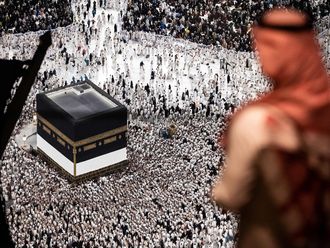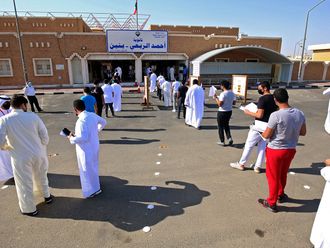Manama: Politics, not religious differences, have roused Muslim anger towards the US, said Dalia Mogahed, US President Barack Obama's Adviser on Faith-Based and Neighborhood Partnerships at the White House Office.
"We discovered that those who viewed the root cause of Muslim-West tensions to be political were more likely to see the conflict as avoidable. Those who viewed it as religious were more likely to see it as unavoidable," she said.
"However, we also found that religiosity in the Muslim community works to the advantage of engagement," Dalia, who is also Executive Director of the Abu Dhabi Gallup Center (ADGC) for Muslim Studies, said in a lecture on "Measuring the State of Muslim-West Relations," held in Kuwait by the Advocate for Westerners-Arab Relations (Aware) Centre on Monday evening.
She based her statement on findings and recommendations of a research conducted by ADGC.
The focus of her lecture was on attitudes by Muslims and Westerners toward interactions between their societies, highlighting new dimensions of the Muslim-West relationship.
"The theme of this lecture was highlighted by President Obama in his inaugural address and later in his famous speech in Cairo in early June 2009. His Cairo speech was received by a standing ovation, as optimism and hope filled up the room. As where have we gone from there, this is the question now," Egyptian-born Dalia said, quoted by Kuwait News Agency (Kuna).
Middle East and North Africa (Mena) peoples placed the highest importance on Muslim-West relations, and have shown the greatest degree of change in attitudes since Obama took office, she said, basing her statement on findings and recommendations of a research by ADGC.
"However, in 2010, Obama's approval rating decreased in several countries in this region. Building on our finding that showing respect for Islam was an important component of improving Muslim-West relations, we found that this meant not only Westerners refraining from desecrating religious symbols, but also demonstrating fairness in Western government policies," she said.
Compared with residents in Asia and sub-Saharan Africa, Dalia said those living in the Mena region place the highest level of importance on Muslim-West relations.
"In 2009, 61 per cent of Mena residents - compared with 52 per cent of those living in Asia and 49 per cent of those in sub-Saharan Africa - said the quality of the interaction between the Muslim and Western worlds is important to them. In addition, Mena residents are the most likely to believe majority Muslim communities are committed to improving interactions with Western societies."
However, Dalia, citing research findings, said "when asked whether the West is committed to improving relations with the majority Muslim societies, minorities of residents in these three regions believe the West is committed."
Between 2008 and 2009, approval of US leadership remained flat in Asia and sub-Saharan Africa, but it increased from 12 to 32 per cent in Mena, Dalia said.
In answer to who is looking for improved relations, she said that across countries, individuals are classified as either "Ready" or "Not Ready" for Muslim-West engagement.
"Overall, Ready individuals perceive their own side (either Western or majority Muslim society) as committed to greater contact with the other. They are positive about greater interaction and believe conflict is avoidable. Not Ready individuals are doubtful of their communities' commitment and respect for the other side. They also reject greater interaction and view a Muslim-West conflict as inevitable."
As a key finding, Dalia said the most meaningful action to display respect for Islam revolves around religious symbols, as 72 per cent of Muslims say abstaining from desecrating Islam's holy book and religious symbols would be very meaningful to them.
Inaugurated in October 2003, Kuwait-based Aware is a non-profit, non-governmental, and non-political organisation working for promoting positive and constructive relations between Westerners and Arabs by organizing social activities and information services related to Arab and Islamic culture.












